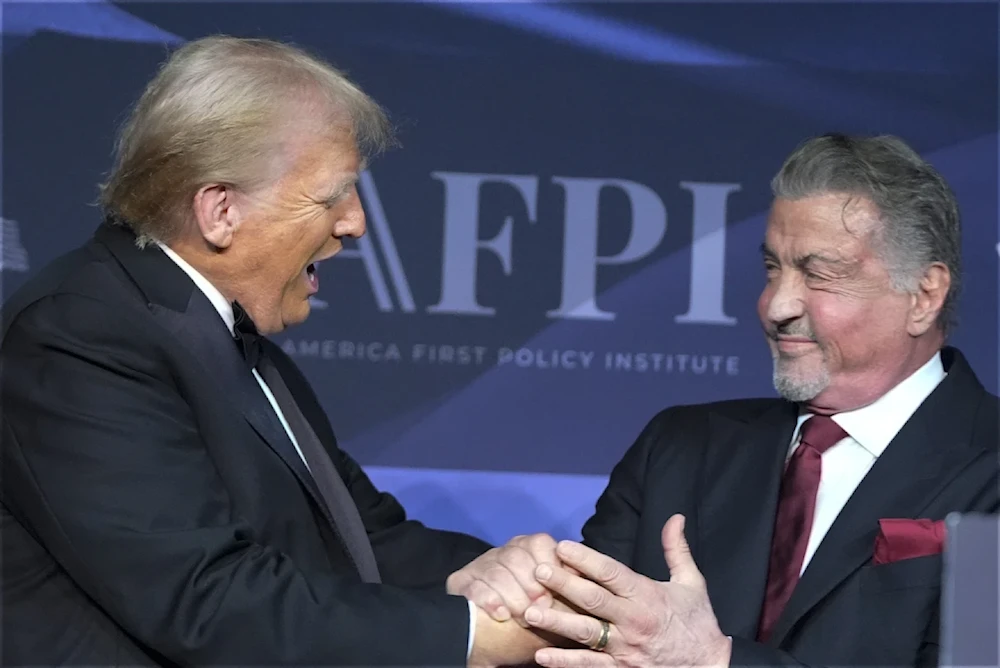Trump orders 100% tariff on foreign films to revive 'dying' Hollywood
According to Trump, the American movie industry is dying a "very fast death" due to the incentives that other countries were offering to lure filmmakers.
-

President-elect Donald Trump greets actor Sylvester Stallone during an American First Policy Institute gala at his Mar-a-Lago estate on November 14, 2024, in Palm Beach, Florida. (AP)
US President Donald Trump announced on Sunday a sweeping 100% tariff on foreign-made movies, claiming the American movie industry is undergoing a “very fast death” as global incentives lure filmmakers away from domestic production.
“This is a concerted effort by other Nations and, therefore, a National Security threat. It is, in addition to everything else, messaging and propaganda,” Trump stated on Truth Social. He added that relevant agencies, including the Department of Commerce, have been authorized to begin implementing the new policy.
“WE WANT MOVIES MADE IN AMERICA, AGAIN!” Trump declared.
The Movie Industry in America is DYING a very fast death. Other Countries are offering all sorts of incentives to draw our filmmakers and studios away from the United States. Hollywood, and many other areas within the U.S.A., are being devastated. This is a concerted effort by…
— Donald J. Trump Posts From His Truth Social (@TrumpDailyPosts) May 4, 2025
Commerce Secretary Howard Lutnick confirmed the directive on X, saying, “We're on it.”
However, neither he nor Trump clarified how the tariff would be enforced. It remains uncertain whether the measure would apply to content on streaming platforms, theatrical releases, or if the tariff would be based on production budgets or revenue.
Trump labels foreign film incentives 'national threat'
The move comes as the United States faces growing competition from countries offering lucrative tax incentives and rebates to attract international productions. Trump framed these offers as part of a coordinated attempt to undermine US creative industries and national messaging.
In January, he appointed Hollywood veterans Jon Voight, Sylvester Stallone, and Mel Gibson to lead a campaign to revive domestic film production.
How the tariff could impact Hollywood and TV production
The American movie industry has steadily shifted overseas, with major companies like Walt Disney, Netflix, and Universal filming extensively in Canada, Britain, and other countries. According to ProdPro, nearly half of US-based productions with budgets over $40 million in 2023 were shot abroad.
Meanwhile, TV production in Los Angeles has dropped nearly 40% over the past decade, according to FilmLA. This year's Los Angeles wildfires have further heightened fears that behind-the-scenes talent, from costume designers to sound engineers, may leave the region altogether.
A survey by ProdPro found California ranks only sixth among the most preferred filming locations, falling behind Toronto, Britain, Vancouver, Central Europe, and Australia.
Industry confusion and lack of implementation clarity
The Motion Picture Association, which represents leading studios, has yet to issue a formal response. Insiders in Hollywood expressed concern on Sunday night over the ambiguity of the policy and whether it could inadvertently target US-owned content filmed abroad.
Global leaders respond as filming hubs come under threat
Officials in Australia and New Zealand swiftly reacted, pledging to defend their local film sectors. Australia has hosted major Marvel productions, while New Zealand is widely known for its role in producing The Lord of the Rings franchise.
Analysts warn of economic retaliation, Hollywood fallout
Critics warn the measure could provoke damaging trade retaliation. William Reinsch, a former senior Department of Commerce official, said the move could backfire dramatically.
“The retaliation will kill our industry. We have a lot more to lose than to gain,” he said, questioning the national security justification for penalizing foreign-made movies.
The announcement marks the latest in a series of tariff measures launched by the Trump administration, many of which have rattled global markets and reignited fears of economic fallout.

 3 Min Read
3 Min Read








